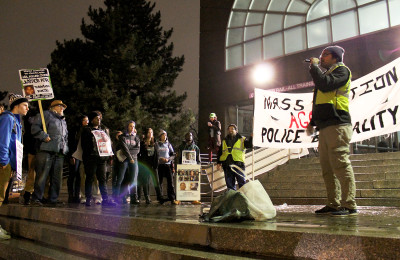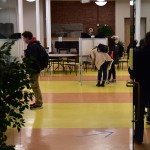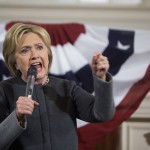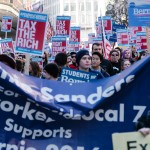
In light of the deaths of Laquan McDonald in Chicago and Jamar Clark in Minneapolis, nearly one hundred people gathered at Ruggles Station Wednesday to speak out against police brutality.
McDonald, an African-American teenager from Chicago, was shot repeatedly by police officer Jason Van Dyke in 2014. Dashboard camera footage of the shooting resurfaced on Nov. 25, 2015. Clark was fatally shot and killed on Nov. 18 in Minneapolis while protesting against police violence. The two police officers involved in the investigation, Mark Ringgenberg and Dustin Schwarze, were cited for not wearing body cameras.
At the demonstration, hosted by Mass Action Against Police Brutality, attendees remained silent with respect as speakers addressed the crowd.
They then chanted in unison, “Indict, convict, send those killer cops to jail, the whole damn system is guilty as hell,” and held signs criticizing the recent acts of violence.
Brock Satter, an organizer of the demonstration, emphasized how sentiments against police brutality are felt throughout all of American society.
“What happened in Chicago and what’s happening in Minneapolis is an example of the effect of this pressure on this movement that we are all a part of today,” Satter said to the crowd. “And we want to say that it’s not just in Minneapolis, it’s not just in Chicago. We have the same problems here in Boston, we have the problems in Massachusetts and in many, many other cities and states across this entire country.”
Satter said that while frustration is a natural response to the deaths of unarmed African Americans, it is important to remember that the movement for ending police brutality deserves more than displaying anger.
“We’re out here to show and demand justice in these cases, and to defend people’s rights, to assemble, to speak without fear of physical violence, or intimidation. By taking this to the streets, taking it directly to the people,” Satter said. “We’re out here to shed light on [unjust acts], and it’s all about exposing the racism that was used to build up this country.”
John Larkins, 26, of Saratoga Springs, New York, spoke next and recounted his experience with police brutality. Arrested and charged with domestic violence in 2011, Larkins was tasered in the head and neck repeatedly despite not resisting arrest.
“The police almost took my life four years ago,” Larkins said. “[Police brutality] happens every day, and I’m just a regular person … I didn’t roll over, I didn’t say this happens to everybody. No, I said this happens to nobody after me.”
Protest attendees provide a platform for survivors to speak out about the injustices they have experienced, Larkins said.
“It’s important to come out, you know why? It’s our freedom,” Larkins said. “So I’m really out here to encourage you to do more than just be on Twitter talking about it or be knowledgeable. We need to get out there and make a direct impact now and what you’re doing today.”
Following the speeches, attendees and speakers marched through local neighborhoods to Dudley Station.
Several attendees expressed dissatisfaction with police brutality and a desire to unite in solidarity.
Marcelle Grair, 24, of Jamaica Plain, said as a result of negative police relations, she does not feel safe in this country.
“When I walk to the [train station] I think about if am I going to be the next person, you know, Sandra Bland, the next Tamir Rice,” she said. “Just walking around the park very innocently, I wonder if am I going to be the next victim. I think about [my safety] every time I go somewhere, and it’s a scary thing and I have nothing to lose [by protesting] at this point.”
Elan Axelbank, a junior at Northeastern University, said the issues of police brutality and racism are affecting the country’s ability to function properly.
“The issues of police brutality and systemic racism are just an absolute disease right now that’s plaguing the whole country and the whole world as well,” he said.
Axelbank added that groups such as MAAPB can help work towards finding a solution for this ongoing issue.
“If we look at history, the system isn’t going to change itself, reform itself or bring upon a new system,” he said. “It has to come upon people and that’s what we’re doing here, and Mass Action Against Police Brutality is building a movement here in Boston.”




